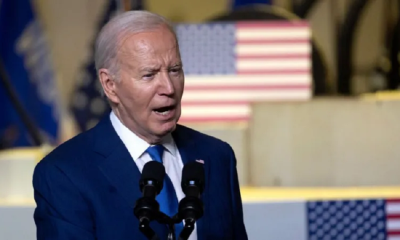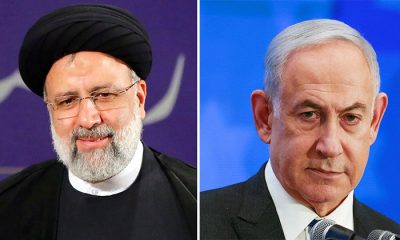Latest News
Biden unveils Israeli proposal to end Gaza war

US President Joe Biden has urged Hamas to accept a new Israeli proposal to end the conflict in Gaza, saying that “it’s time for this war to end”.
The three-part proposal would begin with a six-week ceasefire in which the Israel Defense Forces (IDF) would withdraw from populated areas of Gaza.
There would also be a “surge” of humanitarian aid, as well as an exchange of some hostages for Palestinian prisoners.
The deal would eventually lead to a permanent “cessation of hostilities” and a major reconstruction plan for Gaza.
Hamas said it views the proposal “positively”.
Speaking at the White House on Friday, Mr Biden said that the first phase of the proposed plan would include a “full and complete ceasefire”, the withdrawal of IDF forces from populated areas and the exchange of hostages for Palestinian prisoners.
“This is truly a decisive moment,” he said. “Hamas says it wants a ceasefire. This deal is an opportunity to prove whether they really mean it.”
The ceasefire, he added, would allow more humanitarian aid to reach the beleaguered territory, with “600 trucks carrying aid into Gaza every single day”.
The second phase would see all remaining living hostages returned, including male soldiers. The ceasefire would then become “the cessation of hostilities, permanently.”
Among those who have urged Hamas to agree to the proposal was UK Foreign Secretary David Cameron, who said on X that the group “must accept this deal so we can see a stop in the fighting”.
“We’ve long argued a stop in the fighting can be turned into a permanent peace if we are all prepared to take the right steps,” Lord Cameron added. “Let’s seize this moment and bring this conflict to an end.”
UN Secretary General Antonio Guterres also welcomed the development in a post to X, formerly known as Twitter. He said the world had “witnessed too much suffering and destruction in Gaza” and said it was “time to stop”.
“I welcome President Biden’s initiative and encourage all parties to seize this opportunity for a ceasefire, release of all hostages, guaranteed unhindered humanitarian access and ultimately a durable peace in the Middle East,” he added.
In his speech, Mr Biden acknowledged that negotiations between phases one and two would be difficult.
As recently as a few days ago, Israeli Prime Minister Benjamin Netanyahu was letting it be known that he was implacably opposed to agreeing to end the war as part of a ceasefire deal – making Mr Biden’s reference to the war’s end particularly significant.
While the plan includes many of the details from previous, ultimately failed rounds of talks, the US calls for a permanent ceasefire appear to be a significant concession designed to try and draw Hamas back to negotiations on terms they have already said they would agree to. A permanent ceasefire has been one of the group’s key demands.
The third phase of the proposal would see the final remains of any deceased Israeli hostages returned, as well as a “major reconstruction plan” with US and international assistance to rebuild homes, schools and hospitals.
In his remarks, Mr Biden acknowledged that some Israelis – including officials within Israel’s government – would likely be opposed to the proposal.
“I’ve urged the leadership in Israel to stand behind this deal,” he said. “Regardless of whatever political pressure comes.
The US president also directly addressed the Israeli people, telling them that “we can’t lose this moment”.
Notably, Mr Biden said that Hamas has now been degraded to the extent that it can no longer repeat an attack such as that which its fighters conducted on 7 October – a likely signal to the Israelis that Washington sees the war as done.
In a statement, Prime Minister Netanyahu insisted that the war would not end until its objectives were achieved, including the return of all hostages and the elimination of Hamas’ military and governing capabilities. He said the latest plan would allow Israel to uphold these principles.
Hamas, for its part, said that it views the proposal “positively” because of its call for a permanent ceasefire, the withdrawal of Israeli forces from Gaza, reconstruction and the exchange of prisoners.
The group said it was ready to “deal positively and constructively” to any proposal centred on a permanent ceasefire, provided that Israel “declares its explicit commitment to that”.
Another Palestinian official familiar with the negotiations who has seen the new Israeli proposal said that the document did not include a guarantee that the war will end, nor that IDF troops would withdraw from Gaza completely.
The proposal has been transmitted to Hamas through mediators based in Qatar.
Meanwhile, US Secretary of State Antony Blinken called his counterparts in Jordan, Saudi Arabia and Turkey to try to build a wider support for the proposal.
Mr Blinken “emphasized that Hamas should accept the deal and that every country with a relationship with Hamas should press it to do so without delay,” state department spokesman Matthew Miller said on Friday night.
Faced with mounting civilian casualties in Gaza, President Biden has faced growing domestic criticism over the level of US support for Israel, and calls to do more to encourage the warring sides to negotiate.
Earlier this week, however, the White House said that it does not believe that Israeli operations in Rafah amount to a “major ground operation” that could cross a red line and trigger a possible change in US policy.
The statement came after an Israeli air strike and resulting fire killed at least 45 Palestinians on Sunday.
In a separate announcement on Friday, US lawmakers from both sides of the political spectrum formally invited Mr Netanyahu to address Congress in Washington.
It is unclear when the address would take place.
More than 36,000 have been killed across Gaza since the start of the conflict, according to the Hamas-run health ministry.
The war began in October when Hamas gunmen launched an unprecedented attack on Israel, killing about 1,200 people and taking 252 back to Gaza as hostages.
-BBC-
Latest News
Classy Brook century puts nervy England in the semi-final

If you want a thing done well, do it yourself. Harry Brook, England’s captain, took matters into his own hands in Pallekele, promoting himself to No. 3 and blazing his maiden T20 international hundred to drag his team past Pakistan and into the semi-finals of the Men’s T20 World Cup 2026 with a game to spare, almost single-handedly.
Brook started the tournament, his first as captain, with 53 against Nepal but had been dismissed by spin for less than 20 for four innings in a row. His response was to move up two spots from No. 5 in order to bat in the powerplay, and he found himself walking out to face the second ball after Shaheen Shah Afridi – recalled by Pakistan – struck with the first ball of England’s chase.
Afridi took three wickets in the powerplay to check England’s progress, and Usman Tariq struck twice in the middle overs to reduce them to 58 for 4 and then 103 for 5. But Brook continued to flay Pakistan’s attack to all parts, reaching a 50-ball hundred by launching Afridi over cover for six and then over mid-off for four.
He was cleaned up one ball later by Afridi’s pinpoint yorker, but walked off to a standing ovation with England needing only 10 to win. They made hard work of it, gifting two wickets to Mohammad Nawaz to take the game into the 20th over, but Jofra Archer smeared Salman Mirza through midwicket as England’s dugout breathed a sigh of relief.
England’s win sealed their qualification for the semi-finals with a match to spare, and they will top the group if they can beat New Zealand in Colombo on Friday. They are yet to put a complete performance together and were shoddy in the field against Pakistan, but have now reached the semi-finals for a fifth men’s T20 World Cup in a row.
Pakistan, meanwhile, must beat Sri Lanka in their final group game and rely on other results falling their way. Despite Shahibzada Farhan’s impressive 63, they always look short on runs after they were bogged down by spin in the middle overs, with Liam Dawson’s 3 for 24 the outstanding performance among England’s attack.
Brief scores:
England 166 for 8 in 19.1 overs (Harry Brook 100, Sam Curran 16, Will Jacks 28; Shaheen Shah Afridi 4-30, Mohammad Nawaz 2-26, Usman Tarique 2-31) beat Pakistan 164 for 9 in 20 overs (Shahibzada Farhan 63, Babar Azam 25, Fakhar Zaman 25, Shadab Khan 23; Jofra Archer 2-32, Jamie Overton 2-26, Liam Dawson 3-24, Adil Rashid 1-31) by two wickets
(Cricinfo)
Latest News
More than 5,000 flights cancelled as US east coast digs out of record snow

A major storm hit the US east coast on Monday, bringing record-breaking snow that caused disruptions for millions and thousands of flight cancellations.
Parts of Rhode Island and Massachusetts have seen nearly 37in (94cm) of snowfall, with more than 19in in New York City’s Central Park, the National Weather Service (NWS) said.
Weather warnings stretched from North Carolina to northern Maine, with some in place further north in parts of eastern Canada.
More than 600,000 properties on the US east coast endured power outages, while the Boston Globe – a major US newspaper – said it will not go to print for the first time in its 153-year history due to the storm.
(BBC)
Latest News
Pakistan bat vs unchanged England with Afridi back

Pakistan have recalled Shaheen Shah Afridi for their Super Eight fixture against England in Pallekle at the expense of Faheem Ashraf, and will bat first after Salman Agha won the toss on a fresh pitch.
Afridi’s nine overs at the T20 World Cup have cost 101 runs and he has been left out for consecutive matches after Pakistan’s heavy defeat to India in Colombo, including their no-result against New Zealand to start the Super Eight stage. But he has been recalled to face England, perhaps due to their top order’s perceived vulnerability against left-arm seam.
Ashraf rescued Pakistan in their opening group-stage match against the Netherlands, hitting 29 not out off 11 balls to secure a three-wicket win. But he has only bowled two overs in the tournament and has been batting down the order.
“It looks like a good pitch,” Agha said at the toss. “We want to put up an above-par score and defend that total.”
England will qualify for the semi-finals if they win either of their remaining Super Eight fixtures, but Brook said that he would rather get the job done this evening than face a must-win match against New Zealand on Friday. “That would be lovely, wouldn’t it? But you never know in T20 cricket, it’s such a fickle game,” he said.
Brook said that he would have chosen to bat first if he had won the toss, but expects a better surface than the one that England played on at Pallekele two days ago in their low-scoring win over Sri Lanka. “Hopefully, it’s going to be a little bit better,” he said. “We haven’t had our perfect game yet. Hopefully, it’s just around the corner.”
England have picked the same team for the fifth consecutive match at this World Cup, and have carded their batting line-up in the same order despite some calls for Brook to be promoted from No. 5.
The fixture is a rematch of the 2022 T20 World Cup final, which England won by five wickets at the MCG, and there are nine survivors across the two teams.
England: Phil Salt, Jos Buttler (wk), Jacob Bethell, Tom Banton, Harry Brook (capt), Sam Curran, Will Jacks, Jamie Overton, Liam Dawson, Jofra Archer, Adil Rashid.
Pakistan: Sahibzada Farhan, Saim Ayub, Salman Agha (capt), Babar Azam, Fakhar Zaman, Shadab Khan, Usman Khan (wk), Mohammad Nawaz, Shaheen Shah Afridi, Salman Mirza, Usman Tariq.
(Cricinfo)
-

 Features3 days ago
Features3 days agoWhy does the state threaten Its people with yet another anti-terror law?
-

 Features3 days ago
Features3 days agoReconciliation, Mood of the Nation and the NPP Government
-

 Features3 days ago
Features3 days agoVictor Melder turns 90: Railwayman and bibliophile extraordinary
-

 Features2 days ago
Features2 days agoLOVEABLE BUT LETHAL: When four-legged stars remind us of a silent killer
-

 Features3 days ago
Features3 days agoVictor, the Friend of the Foreign Press
-

 Latest News4 days ago
Latest News4 days agoNew Zealand meet familiar opponents Pakistan at spin-friendly Premadasa
-

 Latest News4 days ago
Latest News4 days agoTariffs ruling is major blow to Trump’s second-term agenda
-

 Latest News4 days ago
Latest News4 days agoECB push back at Pakistan ‘shadow-ban’ reports ahead of Hundred auction

























